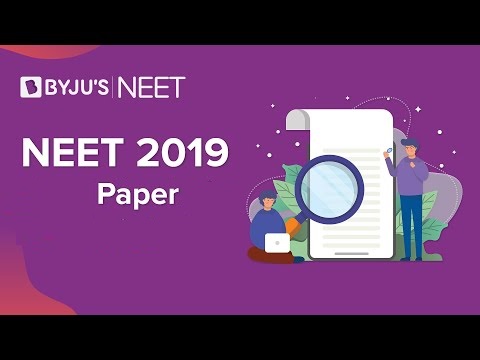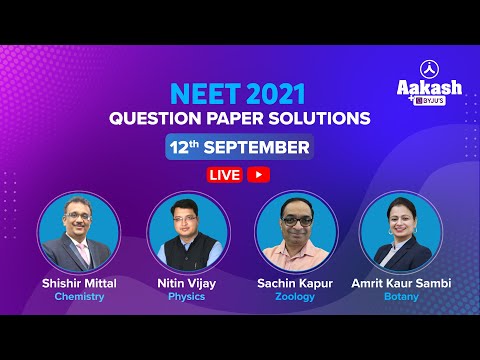NEET Question Paper 2019 with Answer keys – Free PDF Download
NEET, one of the most coveted competitive examinations is just around the corner and preparations are in full swing. The NTA (National Testing Agency) conducts NEET. NEET 2019 was conducted on 5th May 2019. One of the most important preparation tips that every aspirant never fails to miss out on is solving previous years’ papers. Thereby, we at BYJU’S bring to you, question papers from previous years to ease it for students.
NEET 2022 Paper Live Discussion with Solutions | NEET 2022 Question paper with Answer Key | NEET 2022 Paper Discussion Live. Watch now!

Download NEET 2022 Question Paper With Solutions PDF:Download here
Check more: NEET Questions
NEET 2019 Question Paper with Answer Keys – Free Downloadable PDF
NEET aspirants can practise from NEET question papers, ready to download for free and easily accessible. Check NEET 2019 Question Paper below.
NEET 2019 Question Paper with PDF solutions and Answer Keys
| NEET Question Paper 2019 – Download PDF |
| Download NEET 2019 Question Paper |
NEET 2019 Answer Key – Download PDF
NEET 2019 was conducted on 5th May 2019. Students were able to download the final set of answer keys for NEET 2019 from the official website. The following table provides the direct link to download the PDF of the NEET 2019 answer key.
| NEET Answer Keys with Code | Link |
| Download NEET 2019 Answer Key PDF | Click here |
The link provided above in the table provides NEET 2019 answer keys for the following set of codes –
- NEET 2019 Question paper Code P1 – P6 Answer key
- NEET 2019 Question paper Code Q1 – Q6 Answer key
- NEET 2019 Question paper Code R1 – R6 Answer key
- NEET 2019 Question paper Code S1 – S6 Answer key
- NEET 2019 Question paper Code E1 Answer key
- NEET 2019 Question paper Code F1 Answer key
- NEET 2019 Question paper Code G1 Answer key
- NEET 2019 Question paper Code H1 Answer key
Related links: NEET Quiz videos

Understanding NEET with NEET 2019 Question Paper
Referring to NEET 2019 Question Paper To Achieve Good Scores in NEET 2022 Exam
As soon as the exams are conducted, NEET question papers become available to download from the website. The question paper is available for NEET in the following languages: English, Hindi, Marathi, Bengali, Gujarati, Assamese, Tamil, Telugu, Oriya, Kannada, Urdu.
The NEET 2019 paper is available in the following sets – set AA, set BB, set CC, set DD, set EE, set FF, set GG, set HH, set KK, set LL, set MM, set NN, set PP, set QQ, set RR, set SS, set WW, set XX, set YY, set ZZ.
At the time of filling the registration form, candidates were provided with an option to pick their preferred language. One can download all sets of question papers in the links provided. It goes without saying that practising NEET question papers on a daily basis proves to be extremely beneficial for medical aspirants to interpret the difficulty level and get familiarized with the exam pattern and typology of questions, along with the marking scheme.
In order to qualify to get a seat in medical colleges, aspirants must clear NEET cut-off which is mandatory. NEET cut-off will be declared by the NTA – the conducting body for NEET, a few weeks after the exam is concluded along with the result declaration.
Also read: NEET Notes
NEET 2019 Exam Pattern – NEET 2019 Paper with solution
| NEET 2019 Highlights | |
| Number of Questions | 180 questions (MCQs) |
| Exam Mode | Offline mode only (pen and paper-based mode) |
| Type of questions | Objective type questions with 4 options having 1 correct option |
| Duration of Exam | The exam duration is 180 minutes (3 hours) |
| Subjects | Questions are asked from Physics, Chemistry, and Biology (Botany & Zoology) |
| Language | The question paper is asked in 11 languages – English, Hindi, Assamese, Bengali, Gujarati, Kannada, Marathi, Odia, Tamil, Telugu, Urdu |
| Marking Scheme | 4 marks are awarded for each correct answer. |
| Negative Marking | 1 mark is deducted for each wrong answer |
NEET 2019 Marking scheme – NEET 2019 Question Paper
- 4 marks for each question
- For each correct answer, 4 marks are awarded
- For each incorrect answer, 1 mark is deducted
- No marks are awarded if questions are left unanswered or unattempted
NEET 2019 Question Paper Analysis – NEET 2019 Difficulty level
Candidates appearing for NEET 2022 can check out the analysis carried out on the NEET question paper 2019. It enables aspirants to gauge their preparation level, helping them to get insights into their preparation, comprehend terminologies such as the NEET cut-off and get acquainted with it, overall.
The analysis provides insights into the difficulty level of questions, weightage provided to each subject, important topics and much more.
NEET 2019 Question Paper Analysis – How Difficult Was 2019 NEET Paper?
NEET Analysis for 2019 is available section-wise and topic-wise. Some highlights are as follows:
- NEET 2019 was concluded on May 5th
- It was easier compared to the previous years
- The paper saw questions being asked from NCERT for all the 4 sections – Physics, Chemistry, Botany and Zoology
- Physics questions were equally divided between classes 11 and 12. Most of the questions in the 2019 Physics NEET section were from topics – Modern Physics and Mechanics (almost 50% of the physics section), Electrostatistics, Electronics, ray and wave optics
- Easy physics questions were asked from – magnetic effect of electric current and current electricity chapters
- In chemistry, a few questions were beyond NCERT concepts, to name a few – reverse hyperconjugation, molecular orbital configurations of heteroatomic molecules, etc. Concept-based questions appeared and not memory-based
- Biology section saw a major chunk of questions from Biotechnology and Ecology while more questions appeared from Physical Chemistry – almost 19 questions, while Organic chemistry covered 12 questions and inorganic chemistry covered 14 questions.
- Biology section was moderate. Only four questions were difficult and out of NCERT, while the zoology section had 40 questions, the Botany section had 50 questions
- Total of 452 marks was deemed to be easy, 200 were moderate and 60 marks worth of questions were on the difficult side
- 80% of questions in the physics section were numerically based, which required rigorous calculations
Paperwise Analysis of NEET 2019 Paper – NEET 2019 Question Paper Topicwise Marks Distribution
Physics Paper Analysis of NEET 2019
Physics experts for NEET and the candidates, both deemed Physics to be the toughest section compared to other sections. Most of the questions required rigorous calculations along with a good comprehension level. The table below provides a deeper insight into the same, have a look:
NEET 2019 Question Paper Chapterwise Distribution of Questions For NEET Physics 2019
Topicwise Distribution of Questions in NEET Physics 2019 – Chapterwise Weightage
| Topic | Number of questions | Level of difficulty | ||
| Easy | Average | Difficult | ||
| Mechanics | 17 | 0 | 16 | 1 |
| Current Electricity | 3 | 0 | 3 | 0 |
| Electrostatics and Capacitor | 4 | 0 | 4 | 0 |
| Heat and Thermodynamics | 3 | 0 | 3 | 0 |
| Magnetism, Magnetic Effect of Current and AC | 5 | 0 | 4 | 1 |
| Modern Physics | 6 | 0 | 5 | 1 |
| Properties of matter | 3 | 0 | 2 | 1 |
| Ray and Way Optics | 4 | 0 | 4 | 0 |
| Total | 45 | 0 | 41 | 4 |
Physics NEET 2019 Syllabus
NEET Syllabus Physics
|
Class 11th Syllabus |
Class 12th Syllabus |
|---|---|
| Physical world and measurement | Electro statistics |
| Kinematics | Current Electricity |
| Laws of Motion | Magnetic effects of Current and Magnetism |
| Work, Energy, and Power | Electromagnetic induction and alternating currents |
| Motion of systems of particles and rigid body | Electromagnetic waves |
| Gravitation | Optics |
| Properties of Bulk Matter | Dual Nature of Matter and Radiation |
| Thermodynamics | Atoms and Nuclei |
| Behavior of Perfect Gas and Kinetic theory | Electronic Devices |
| Oscillations and wave |
Chemistry Paper Analysis of NEET 2019
NEET 2019 Question Paper Chapterwise Distribution of Questions For NEET Chemistry 2019
Experts suggest that the chemistry section of NEET 2019 paper was the easiest compared to last year’s paper. Chemistry section saw questions appearing from these sections – Organic, Inorganic and Physical Chemistry. The numerical questions from the chemistry section were all formula-based.
Topicwise Distribution of Questions in NEET Chemistry 2019 – Chapterwise Weightage
| Topic | Number of questions | Level of difficulty | ||
| Very Easy | Easy | Average | ||
| Physical | 19 | 10 | 5 | 4 |
| Inorganic | 14 | 5 | 5 | 4 |
| Organic | 12 | 5 | 5 | 2 |
| Total | 45 | 20 | 15 | 10 |
Chemistry NEET 2019 Syllabus
NEET Syllabus Chemistry
| Class 11th Syllabus | Class 12th Syllabus |
| Some basic concepts of Chemistry (Physical Chemistry) | Solid state (Physical Chemistry) |
| Structure of atom (Physical Chemistry) | Solutions (Physical Chemistry) |
| Classification of Elements and Periodicity in Properties (Inorganic Chemistry) | Electrochemistry (Physical Chemistry) |
| Chemical Bonding and Molecular structure (Inorganic Chemistry) | Chemical Kinetics (Physical Chemistry) |
| States of Matter: Gases and liquids (Physical Chemistry) | Surface Chemistry (Physical Chemistry) |
| Thermodynamics (Physical Chemistry) | General principles and Processes of Isolation of Elements (Inorganic Chemistry) |
| Equilibrium (Physical Chemistry) | P Block elements (Inorganic Chemistry) |
| Redox reactions (Physical Chemistry) | D and F block elements (Inorganic Chemistry) |
| Hydrogen (Inorganic Chemistry) | Coordination compounds (Inorganic Chemistry) |
| s-Block elements (Alkali and Alkaline earth metals) (Inorganic Chemistry) | Haloalkanes and Haloarenes (Organic Chemistry) |
| Some p-Block elements (Inorganic Chemistry) | Alcohols, Phenols, and Ethers (Organic Chemistry) |
| Organic Chemistry – Some basic principles and techniques | Aldehydes, Ketones and Carboxylic Acids (Organic Chemistry) |
| Hydrocarbons (Organic Chemistry) | Organic compounds containing Nitrogen (Organic Chemistry) |
| Environmental chemistry (Organic Chemistry) | Biomolecules, Polymers, and Chemistry in everyday life (Organic Chemistry) |
Biology Paper Analysis of NEET 2019
NEET 2019 Question Paper Chapterwise Distribution of Questions For NEET Biology 2019
Most of the questions in the Biology part, as suggested by experts and aspirants, were easier from the Zoology section compared to the Botany section. But in comparison to zoology, more questions were asked from Botany.
Topicwise Distribution of Questions in NEET Biology 2019 – Chapterwise Weightage
| Topic | Number of questions | Level of difficulty | ||
| Easy | Average | Difficult | ||
| Botany | 50 | 8 | 40 | 2 |
| Zoology | 40 | 6 | 31 | 3 |
| Total | 90 | 14 | 71 | 5 |
You might be interested in: NEET 2020 Question Paper Analysis
Biology NEET 2019 Syllabus
NEET Syllabus Biology
| Class 11th Syllabus | Class 12th Syllabus |
| Diversity in the Living World | Reproduction |
| Structural organization – Plants and Animals | Genetics and Evolution |
| Cell Structure and Function | Biology and Human welfare |
| Plant Physiology | Biotechnology and its applications |
| Human physiology | Ecology and environment |
NEET 2019 Cut-off
NEET Cut off is the minimum score a candidate must secure to successfully qualify for medical counselling. The regulatory body for NEET, the NTA (National Testing Agency), announces the NEET Cut off marks along with the declaration of results.
Important Factors That Decide The NEET Cut off
NEET cut off is subject to change each year based on different aspects. Listed below are the aspects which contribute to decide the NEET cut-off:
- Total students appearing for NEET that year
- Seat Availability
- Reservation policy of the government as per category
- The difficulty level of the NEET question paper that year
- Marking Scheme and NEET cutoff trends from previous years
The NEET cut-off percentile is provided on the scorecard along with the NEET cut-off score and the number of applicants for that particular year. Those candidates who have cleared the cut-off and are qualified, must self-register for the process of NEET Counselling which generally is conducted a few weeks after the results are declared.
Listed below are some of the statistics from NEET 2019:

Advantages of using NEET 2019 Question Paper and Solutions
Why Solving from NEET 2019 Question Paper Can be beneficial?
- A great resource to assess and track performance
- Question papers give students a clear idea about the different metrics of exams such as pattern, marking scheme, typology of questions, sections etc
- An effective way to manage time by practising these question papers
- Students get an idea of recurring and important topics to prioritize
- Practising these papers makes it a cakewalk for students to answer questions in the examination hall
- It gets us habituated to the ideal exam scenario, thus improving speed, accuracy levels
Best Books For NEET Preparation 2019
Best Books for NEET 2019 Physics Preparation – NEET Syllabus Physics
| Concepts of Physics by H. C. Verma |
| NCERT (Textbook) Physics – Class 11 & 12 |
| D. C. Pandey Objective Physics |
| Fundamentals of Physics by Halliday, Resnick, and Walker |
| Problems in General Physics by I. E. Irodov |
Best Books for NEET 2019 Chemistry Preparation – NEET Syllabus Chemistry
| NCERT (Textbook) Chemistry |
| Physical Chemistry by O. P. Tandon |
| Organic Chemistry by Morrison and Boyd |
| Modern ABC for Chemistry for Class 11 & 12 |
| Concise Inorganic Chemistry by J. D. Lee |
| Chemistry by Dinesh |
Best Books for NEET 2019 Biology Preparation – NEET Syllabus Biology
| NCERT (Textbook) Biology for Class 11 & 12 |
| Trueman’s Biology – Volume 1 & Volume 2 |
| Objective Biology – Dinesh |
| Biology by Pradeep’s Publications |
| Biology by GRB Bathla’s Publications |

NEET 2019 Question paper with solutions – Video Solutions
NEET 2019 BIOLOGY Solutions – Videos






This was a brief on NEET 2019 paper with solutions. BYJU’S provides a plethora of study material related to NEET, stay tuned with us for the latest updates on NEET.
Also Read:
| NEET Preparation Tips |
| NEET Syllabus |
Byjus is very useful for neet preparations
Byju’s is the best learning app which is a suitable study material for exams like NEET. I’m very thankful for this learning app.
Byju’s is the best learning app. Thank you Byju’s